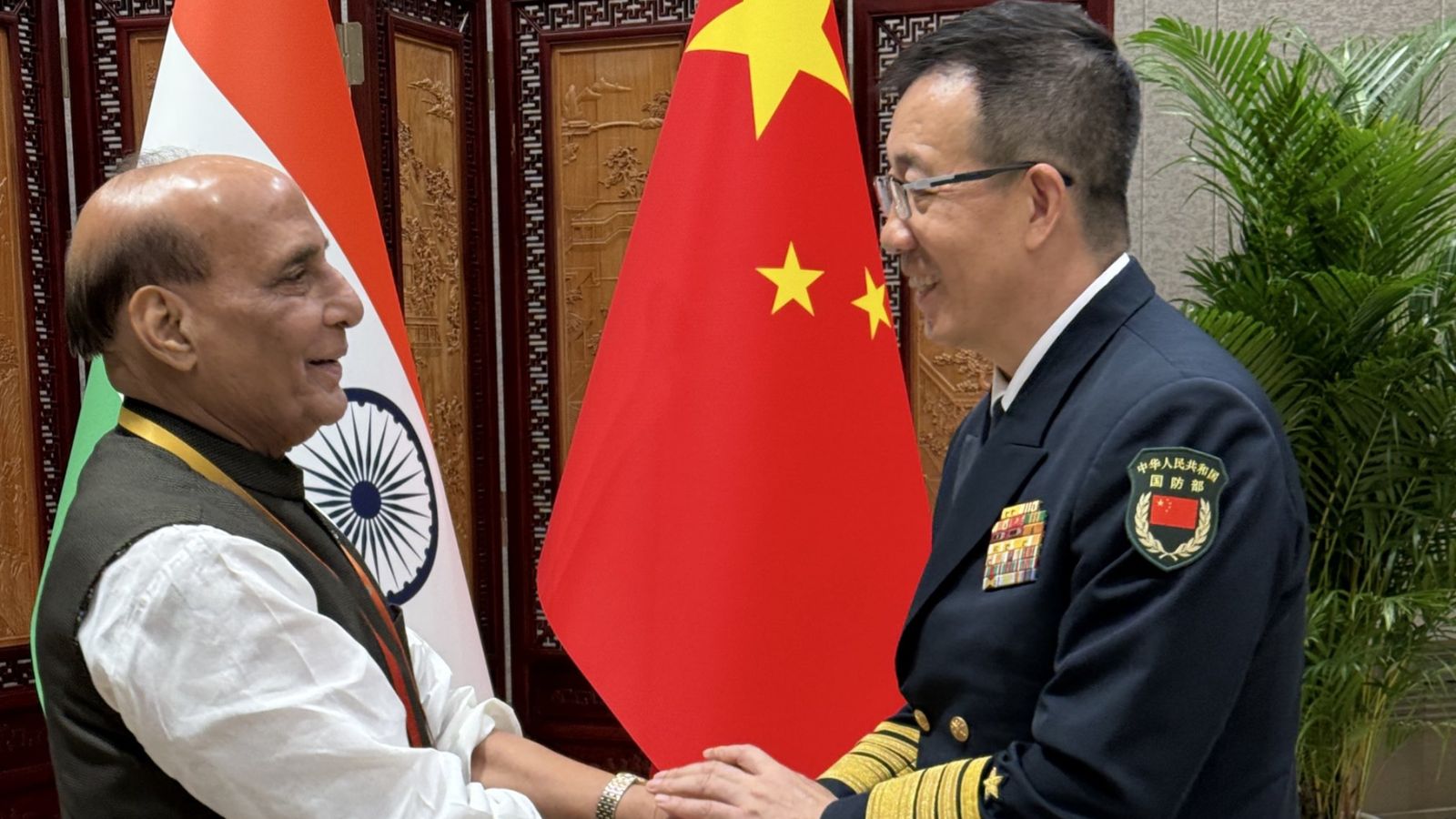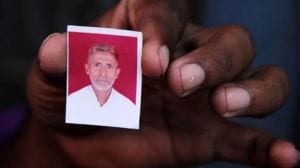Eight months after the disengagement of troops at the Line of Actual Control (LAC) in eastern Ladakh, Defence Minister Rajnath Singh has told his Chinese counterpart Admiral Dong Jun that there is need for a “structured roadmap of permanent engagement and de-escalation”. He called for a “permanent solution of border demarcation”.
In his talks Thursday with Dong on the sidelines of the meeting of Defence Ministers of the Shanghai Cooperation Organisation (SCO) in Qingdao, Singh underlined the need for “bridging the trust deficit created after the 2020 border standoff, by taking action on ground”.

The Ministry of Defence, in a statement Friday, said Singh and Dong agreed to continue consultations at various levels to achieve progress on issues related to “disengagement, de-escalation, border management and eventual de-limitation through existing mechanisms”.
Even after the disengagement along the LAC in eastern Ladakh, de-escalation has not happened. An estimated 50,000-60,000 troops are still stationed on either side of the LAC in the region.
The mention of a “structured roadmap” for permanent engagement and de-escalation is a new formulation – both sides have been working towards normalising their relationship after the bitter military standoff.
The previous meetings between the two sides had focused on trust, understanding and confidence-building through engagements and maintaining peace and tranquility along the borders. But there was no talk of a “structured roadmap”, key to the remaining steps for “de-escalation”.
The statement on the Qingdao meeting did not mention “de-induction” of troops while speaking on “border management” and “eventual de-limitation”.
Story continues below this ad
The Ministry said the two ministers held “in-depth discussions on the need to maintain peace and tranquility” along the border.
It said Singh “acknowledged the work being undertaken by both sides to bring back semblance of normalcy in the bilateral relations” – the resumption of the Kailash Mansarovar Yatra is a pointer to that.
Singh, in a post on X, said, “Held talks with Admiral Dong Jun, the Defence Minister of China, on the sidelines of SCO Defence Ministers’ Meeting in Qingdao. We had a constructive and forward looking exchange of views on issues pertaining to bilateral relations.”
“Expressed my happiness at the restarting of the Kailash Mansarovar Yatra after a gap of nearly six years. It is incumbent on both sides to maintain this positive momentum and avoid adding new complexities in the bilateral relationship.”
Story continues below this ad
According to the Ministry, Singh “highlighted the necessity of solving the complex issues through a structured roadmap of permanent engagement and de-escalation.”
He “also stressed on border management and to have a permanent solution of border demarcation by rejuvenating the established mechanism on the issue”, it said.
“He emphasised the need to create good neighbourly conditions to achieve best mutual benefits as well as to cooperate for stability in Asia and the world. He also called for bridging the trust deficit, created after the 2020 border standoff, by taking action on ground,” it said.
Singh also briefed his counterpart “on the heinous terrorist attack carried out against innocent civilians in Pahalgam” and Operation Sindoor aimed at dismantling the terrorist networks in Pakistan, the Ministry said.
Story continues below this ad
This was Singh’s second engagement with Dong since October 2024 when both sides agreed to disengage in eastern Ladakh after a military standoff for more than four years.
Before this, Singh held three bilateral meetings with his Chinese counterparts since 2020 – in September 2020 in Moscow, in April 2023 in New Delhi (both on the sidelines of the SCO Defence Ministers’ Meeting) and in November 2024 at Vientiane, Laos, on the sidelines of the 11th ASEAN Defence Ministers’ Meeting-Plus.
In Qingdao, Singh also held a bilateral meeting with Russian Defence Minister Andrey Belousov where the supply of S-400 systems, Su-30 MKI upgrades and procurement of critical military hardware in expeditious timeframes were discussed.
The Ministry, in a statement, said, “The two Ministers held in-depth discussions on a range of subjects covering current geopolitical situations, cross-border terrorism and Indo-Russian defence cooperation.”
Story continues below this ad
It said Belousov “highlighted the long-standing Indo-Russian relations which have stood the test of time and expressed solidarity with India on the horrendous and cowardly terrorist act” in Pahalgam on April 22.
ExplainedMoving to repair ties
Following the meeting between their leaders in Kazan last October and the disengagement of troops along the LAC in Ladakh, India and China have been trying to repair their ties. The resumption of the Kailash Mansarovar Yatra is a step in that direction.
“It was one of the most important recent meetings between the leaders of the two nations, being held in the backdrop of Operation Sindoor and the consequent necessity of augmenting defence production, especially in critical items such as air defence, air-to-air missiles, modern capabilities, and upgrades of air platforms. Supply of S-400 systems, Su-30 MKI upgrades, and procurement of critical military hardware in expeditious timeframes were some of the key takeaways of the meeting,” the Ministry said.
Singh also held bilateral meetings with Belarus Defence Minister Lt General Victor Khrenin, Tajikistan Defence Minister Lt General Sobrizoda Emomali Abdurakhim and Kazakhstan Defence Minister Lt General Dauren Kosanov.
He highlighted the importance of continued engagement in defence cooperation and exploring new opportunities for collaboration in areas of technical collaboration, while speaking about the rapid advances made by India in the field of defence production and achieving self-reliance in meeting its defence requirements in several key areas.
Story continues below this ad
The Ministers agreed to continue cooperation to enhance capacity building, training, military technical cooperation, military education amongst other areas of common interest, the Ministry said.










